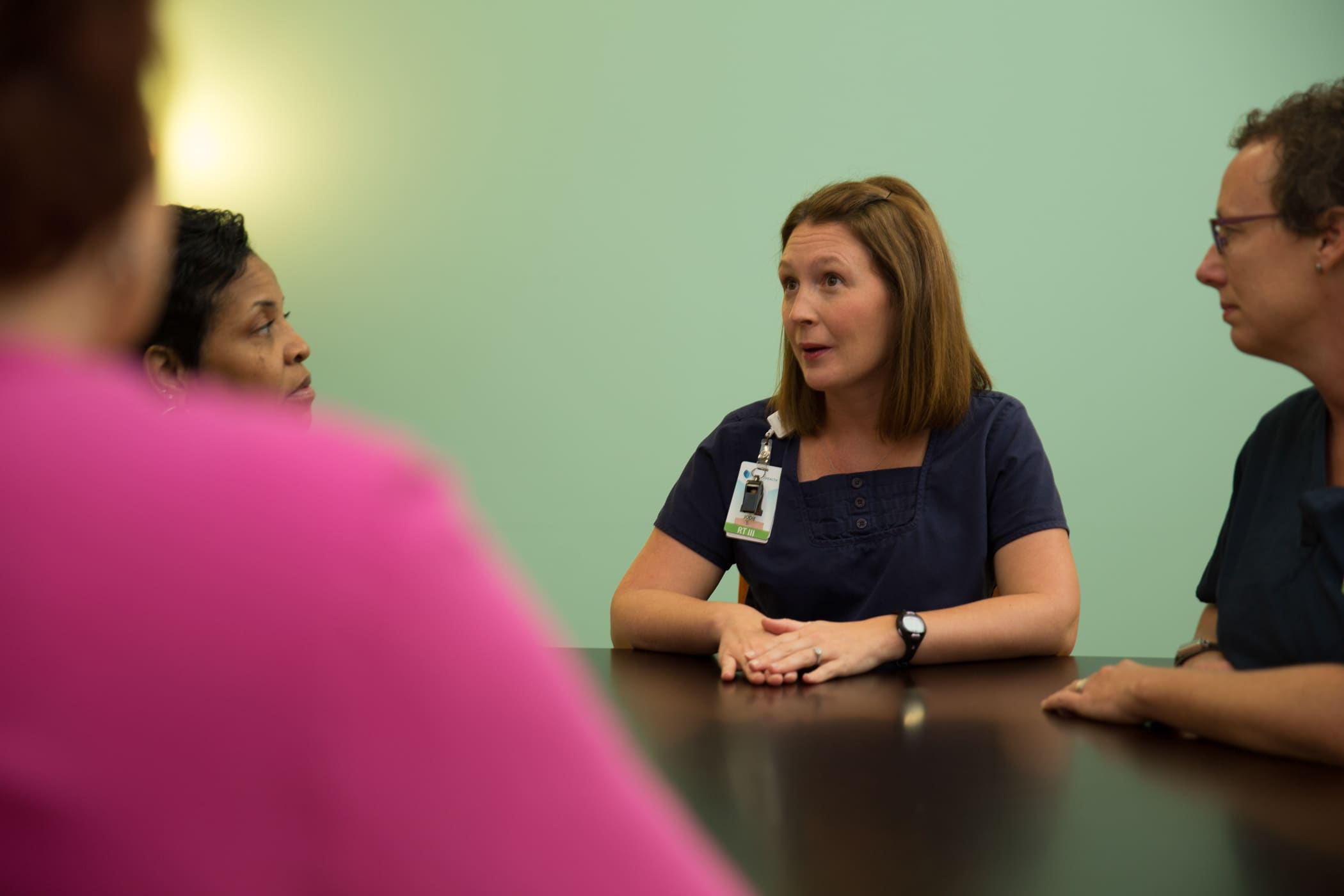GREENVILLE, N.C. – ECU Health and Acadia Healthcare announced today plans to build a state-of-the-art, 144-bed behavioral health hospital in the medical district of Greenville, N.C., less than a mile from ECU Health Medical Center. This new facility will be a center of excellence, providing North Carolinians with important access to behavioral health services and treatment from specialized clinical teams in a carefully designed environment.
Slated to open in spring 2025, the hospital will be operated through a joint venture between ECU Health and Acadia, the largest standalone provider of behavioral healthcare services across the United States. Together, the organizations will invest approximately $65 million in expanding behavioral health resources in eastern North Carolina.
![Perspective View 2 - NIGHT [no-logo] Conceptual rendering of new behavioral health hospital](https://www.ecuhealth.org/wp-content/uploads/2022/07/Perspective-View-2-NIGHT-no-logo.jpg)
The hospital will include 24 inpatient beds specifically for children and adolescents with mental health needs. These beds will be the first of their kind in ECU Health’s 29-county service area and the only child and adolescent beds within 75 miles of Greenville, North Carolina.
“This hospital will be a tremendous resource for our patients and our state, and we’re thrilled to bring a partner and a national leader like Acadia to eastern North Carolina,” said Dr. Michael Waldrum, chief executive officer of ECU Health and dean of the Brody School of Medicine at East Carolina University. “Acadia has an established track record of providing high-quality, compassionate care in communities across the country. Together, we will strengthen our level of expertise, implement proven best practices and enhance the quality and number of behavioral health services available to patients throughout the region.”
Prior to the pandemic, nearly one in five North Carolinians were experiencing a mental, behavioral or emotional disorder, according to a report from the North Carolina Institute of Medicine’s Task Force on Mental Health and Substance Use. In the last two years, national data indicates a growing trend of depression and anxiety symptoms. This partnership demonstrates a commitment to talking about mental health disorders, normalizing and treating them with the latest science and medicine in appropriate care settings.
“As a clinician, seeing this type of investment and understanding the significant impact it will have on patients is exciting,” said Dr. Syed A. Saeed, an ECU Health board-certified psychiatrist with more than 40 years of experience. “The needs of behavioral health patients differ from other patients and vary widely even within the same diagnosis. This state-of-the-art hospital will allow us to fully meet our patients’ unique needs in a safe, patient-centered environment and ensure clinicians have the resources and training needed to deliver excellent care.”
The new hospital will also serve as a teaching hospital, training students and residents from the Brody School of Medicine, many of whom will go on to practice in eastern North Carolina and carry forth ECU Health’s mission to improve the health and well-being of the region.
“We are always seeking like-minded partners who share our commitment to expanding access to high-quality behavioral health services and transforming the way mental health patients are seen and cared for,” said Chris Hunter, chief executive officer of Acadia Healthcare. “Establishing a center of excellence in partnership with ECU Health presents a unique opportunity for us to support the development of the next generation of behavioral health care workers and clinicians. We’re excited to begin this important work with such a committed, patient-focused partner.”
Construction is expected to begin in 2023, pending standard state and regulatory approvals and gaining a Certificate of Need. To facilitate the development of the new 144-bed behavioral health hospital, ECU Health will transfer 80 of its current behavioral health beds.
To learn more about the potential partnership between ECU Health and Acadia Healthcare, visit
ENCBehavioralHealth.org.
Find more information in our Press Kit.
The promise of fresh starts, prioritizing and setting goals have become synonymous with the New Year. As you reflect on the physical, professional and financial goals you hope to accomplish in 2022, do not forget to take your emotional well-being into consideration.
“It is important to take time and make mental health a priority in your life, just as you would seek proactive lifestyle activities such as physical exercise and healthy eating,” said Dr. Ashley Britton, clinical assistant professor and psychologist at ECU’s Brody School of Medicine and ECU Health Medical Center. “To keep mentally fit, you should focus on enjoyable and meaningful activities as well as practice activities to keep your brain stimulated.”
With the start of 2022, the ongoing pandemic continues to disrupt lives and profoundly impact mental health. People continue to struggle with depression and anxiety as we experience expanded time in isolation. There are some key tips for helping us cope with the toll the pandemic is taking on us both mentally and physically. Maintaining structure and routines will greatly help with fortifying your mental well-being.

Chronic stress demands elevated levels of energy and cognitive hypervigilance but is not sustainable over time. In fact, chronic stress is extremely harmful to our health in the long term. Our bodies address stress through a process called General Adaptation Syndrome (GAS) that aims to manage stress and return us to normal, healthy levels of functioning, according to Dr. Britton. General adaptation syndrome affects the body in three stages.
The first stage is the alarm reaction stage also known as “fight or flight,” where your body sends a distress signal to the brain, causing it to release hormones including adrenaline. The second stage is the resistance stage, when your body is trying to recover from the alarm reaction. If there is persistent stress, you could experience lack of concentration and short term memory issues. The third stage is known as the exhaustion stage or the “burned out” feeling, which is what the extended pandemic has caused many of us to experience.
“In 2021, there was the sense that people were just trying to push through the pandemic,” said Dr. Britton. “However, for 2022, it is the time to practice resiliency and move forward by renewing or creating new connections to friends and resources.”
Connecting to others is a key factor in building resiliency, whether it be through phone conversations, virtual conversations or safe socially distanced or masked physical interactions such as talking in person. Communicating with others not only helps you feel better connected, it also helps you focus on what others around you are going through and takes you out of your own problems, keeping you engaged by helping others.
Focusing on what is positive in your life and what is going well is another important factor in becoming more resilient.
“Having work teams participate in a ‘weekly wins’ session, where you either recognize a positive experience from the week or something in the week ahead is an excellent activity to promote focus on positivity,” Dr. Britton said.
Another tip for better mental health is having a particular physical item in your possession that can help ground you in times of stress.
“A photo, ring, bracelet or other personal item can help you focus on your positive connections to them and help keep you present in the moment,” Dr. Britton said. “Keeping your mind stimulated helps direct your thoughts and activities away from negativity and on something that can add to your life, a new hobby or skill. Painting or journaling are some examples of activities to engage the brain in creative pursuits that help with purpose and positivity.”
As you set goals and plans for 2022, remember to give yourself a break when encountering life’s inevitable bumps. Self-compassion is about being inwardly understanding, encouraging and kind in the face of setbacks – a reaction we commonly extend to friends and family members but can forget when it comes to ourselves.
If you or someone you love are experiencing depression or anxiety, reach out for help. The National Suicide Prevention Lifeline can be reached at any time at 800-273-TALK (8255). Integrated Family Services provides Mobile Crises services in many eastern North Carolina counties. Call 866-437-1821 or visit integratedfamilyservices.net.
These topics included psychiatric disorders, stress management, resiliency and substance use. This series came at a crucial time, as COVID-19 kept many people indoors and away from their typical routines. That isolation and facing many unknowns in our world brought out mental health challenges.
Data trends show a steady increase in adults suffering from anxiety, stress, and depression over the past year.
Glenn Simpson, system service line administrator for Behavioral Health at Vidant, joined WITN to discuss the series.
“Some studies are indicating that four out of 10 of us in the last year have experienced depression or anxiety in a clinical range,” Simpson said. “If you went back two years, that would have been one out of 10, so we are very concerned about people’s mental health. Often times we will take care of our physical health before our mental health. We’re hoping by this series to help folks reach out for the help they need.”
Simpson said the series was exciting and brought forward experts in the field to talk to the general public about mental health and well-being.
Video recordings from the series can be found in the Behavioral Health section of VidantHealth.com.
Anxiety in adults exasperated over the pandemic
A new study from GlobalWebIndex has shown that many adults are worried about the lasting effects the pandemic will have on mental health.
According to the study, 28% of Millennials, and 29% of Gen X adults believe the pandemic will have long-term impacts on their mental health. Additionally, the study found that anxiety, stress and insomnia had all risen across all age groups in the study.
Dr. Nathan Harper, medical director for inpatient psychiatry at ECU Health Medical Center and ECU, said he there has been an increase in patients for mental health needs and services, not only in adults but for children as well. Dr. Harper said he believes isolation from quarantine made some of these issues more prevalent.
Dr. Harper discussed the study and his experience during a recent interview with WNCT.
Vidant has resources and information available on the Programs & Support page.

